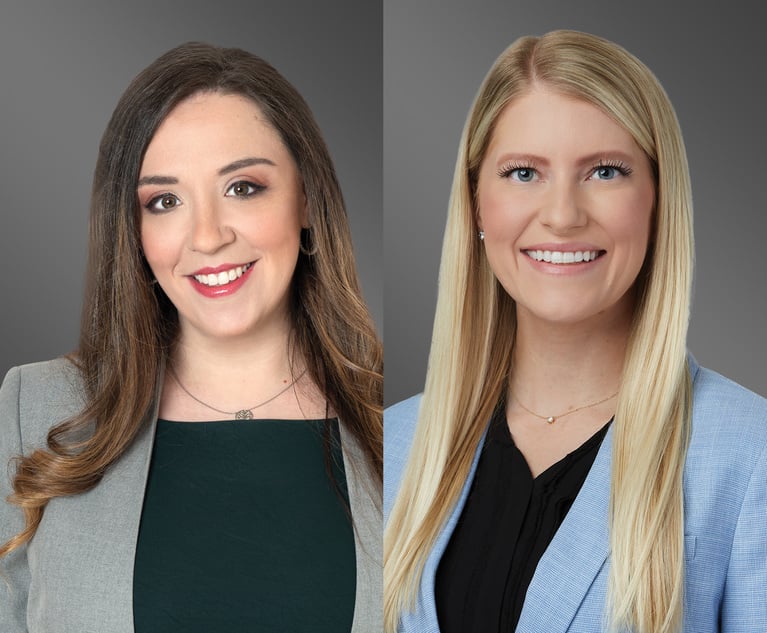Implications of 'FMI v. Argus Media Leader' on Trade Secret Law
The Supreme Court's decision in 'FMI v. Argus Media Leader' will have important implications for companies' disclosed information. In fact, it may render certain information that would otherwise qualify as a trade secret under the Defend Trade Secrets Act obtainable under FOIA and therefore “readily ascertainable through proper means.”
June 21, 2019 at 01:41 PM
6 minute read
 L-R: Rose Sun, Esha Bandyopadhyay, and J. Kain Day of Fish & Richardson.
L-R: Rose Sun, Esha Bandyopadhyay, and J. Kain Day of Fish & Richardson.
The Freedom of Information Act (FOIA) requires federal agencies to disclose their records, unless the requested information is protected from disclosure under an exemption. Exemption 4, one such exemption, protects (1) trade secrets and (2) commercial or financial information that is obtained from a person and is privileged or confidential.
In National Parks & Conservation Association v. Morton, the D.C. Circuit held that commercial information is “confidential for the purposes of [Exemption 4] if disclosure of the information is likely … to cause substantial competitive harm to the person from whom the information was obtained.” Even after subsequent clarification, the D.C. Circuit's definition of “confidential” has resulted in at least five circuit splits. That deep divide leaves disclosing companies to guess at what will become of their information.
Now, in FMI v. Argus Media Leader, the Supreme Court is poised to interpret “confidential” as used in the second prong of Exemption 4. The result will have important implications for companies' disclosed information. In fact, as discussed below, it may render certain information that would otherwise qualify as a trade secret under the Defend Trade Secrets Act (the DTSA) obtainable under FOIA and therefore “readily ascertainable through proper means.”
The Interplay Between FOIA and the DTSA
The DTSA provides a means for protecting undisclosed—i.e., “not generally known or readily ascertainable through proper means”—information. FOIA provides an official means for obtaining certain information. To be sure, a FOIA request qualifies as a “proper means.” So if certain information that would otherwise be protectable as trade secret is subject to disclosure under FOIA, that information will lose the protection granted by the DTSA.
Exemption 4's First Prong and the DTSA
Exemption 4's first prong excludes “trade secrets” from disclosure under FOIA. But the D.C. Circuit defines that term in an unusual way. A “trade secret” is limited to a “secret, commercially valuable plan, formula, process, or device that is used for the making, preparing, compounding, or processing of trade commodities and that can be said to be the end product of either innovation or substantial effort.” Thus, Exemption 4's “trade secret” prong does not protect commercial or financial information, including sales statistics, profits, losses, pricing information, food quality inspections, and airplane-engine designs.
The DTSA, on the other hand, provides a broader definition of trade secret. A “trade secret” is any “financial, business, scientific, technical, economic, or engineering information … [that] derives independent economic value, actual or potential, from not being generally known to, and not being readily ascertainable through proper means.” Where FOIA's definition excludes commercial and financial information, the DTSA's definition explicitly includes such information. Moreover, the DTSA's definition of technical trade secrets does not require the same “direct relationship between the information at issue and the productive process.”
Thus, although the first prong of Exemption 4 refers to “trade secrets,” it does not reach all DTSA-protected information. Companies must therefore rely on the second prong of Exemption 4 to pick up the slack. Otherwise, certain potentially-valuable information could be deemed “readily ascertainable through proper means,” destroying any trade secret protection.
Will 'FMI' Allow the Second Prong of Exemption 4 to Pick Up the Slack?
FMI is poised to determine whether the second prong of Exemption 4 will cover the some of the gap left by the first prong (i.e., information that would be protectable under the DTSA but that is not covered under the “trade secrets” prong of Exemption 4). We know that regardless of FMI's holding, certain otherwise protectable information under the DTSA will be stripped of trade secret protection under FOIA. First, FMI will not address the scope of the “trade secret” prong; accordingly, FMI will not address the inconsistency between the FOIA definition of “trade secrets” and the DTSA definition of “trade secrets.” Moreover, regardless of the outcome of FMI with respect to “commercial or financial information,” FMI will not address technical trade secrets. Thus, as discussed above, technical information otherwise protectable under the DTSA will be “readily ascertainable through proper means” by virtue of a FOIA request, thereby destroying any trade secret protection. With respect to similarly-situated commercial or financial information, however, there remains hope. And no matter how the court defines “confidential,” there will be an impact on whether commercial or financial information is deemed a trade secret.
If the court adopts the plain and ordinary meaning of “confidential”—“in confidence” and meant to be kept secret, this definition would be broader than the DTSA's definition of “trade secret.” In addition to basic secrecy, the DTSA requires that the confidentiality of “trade secrets” result in economic value. If economic information need only be “confidential” to be protected under Exemption 4, valueless information will also be protected. Under this interpretation, companies will enjoy greater protection for a broader set of information.
On the other hand, the court may adopt a version of the National Parks test for confidentiality, i.e., whether there is substantial competitive harm to the person from whom the information was obtained. Generally, the circuits agree that “actual competitive harm” is not required to satisfy National Parks' “substantial competitive harm” standard. “Actual competition” with a “likelihood of substantial competitive injury” will suffice. But the courts debate exactly what constitutes “actual competition” and what is sufficient to show a “likelihood.” Regardless of the outcome of the debate, the “substantial economic harm” test will render certain information “readily ascertainable” even though it would otherwise qualify as a “trade secret” under the DTSA. The DTSA only requires that economic trade secret information “derive[] economic value” from its secrecy. The “substantial economic harm” test requires more: it requires substantial economic value. That additional requirement—excluding insubstantial economic value—inevitably excludes certain trade secrets. The higher the bar for “substantial economic harm,” the more otherwise-protectable information becomes readily ascertainable. Under this interpretation, certain economic trade secrets would not enjoy full DTSA protection—especially if those secrets are minor ones.
Regardless of the court's holding, FMI holds far-reaching implications for companies concerned with protecting their trade secrets. As it stands, companies that are required to disclose information to one or more federal agencies are at a disadvantage. Certain categories of information that other companies may protect as trade secret are unavailable to those required to make disclosures. FMI may remedy some of this inequity, but it will certainly not level the playing field.
Esha Bandyopadhyay, a principal in Fish & Richardson's Silicon Valley office, has been practicing intellectual property and technology-related commercial litigation and counseling in the Bay Area for close to two decades. Kain Day is an associate in the firm's Silicon Valley office, where he maintains a broad practice, focusing on commercial, trade secret, and patent litigation matters. Rose Sun, a summer associate at the firm, is a rising 3L at the University of Southern California Gould School of Law.
This content has been archived. It is available through our partners, LexisNexis® and Bloomberg Law.
To view this content, please continue to their sites.
Not a Lexis Subscriber?
Subscribe Now
Not a Bloomberg Law Subscriber?
Subscribe Now
NOT FOR REPRINT
© 2025 ALM Global, LLC, All Rights Reserved. Request academic re-use from www.copyright.com. All other uses, submit a request to [email protected]. For more information visit Asset & Logo Licensing.
You Might Like
View All
What Will It Mean in California if New Federal Anti-SLAPP Legislation Passes?
9 minute read
For Growing Law Firms, Customizable Financing Can Unlock Opportunities
6 minute read
The Rise of Female Breadwinners: Challenging Traditional Divorce Dynamics
4 minute read
An Overview of Proposed Changes to the Federal Rules of Procedure Relating to the Expansion of Remote Trial Testimony
15 minute readTrending Stories
- 1We the People?
- 2New York-Based Skadden Team Joins White & Case Group in Mexico City for Citigroup Demerger
- 3No Two Wildfires Alike: Lawyers Take Different Legal Strategies in California
- 4Poop-Themed Dog Toy OK as Parody, but Still Tarnished Jack Daniel’s Brand, Court Says
- 5Meet the New President of NY's Association of Trial Court Jurists
Who Got The Work
J. Brugh Lower of Gibbons has entered an appearance for industrial equipment supplier Devco Corporation in a pending trademark infringement lawsuit. The suit, accusing the defendant of selling knock-off Graco products, was filed Dec. 18 in New Jersey District Court by Rivkin Radler on behalf of Graco Inc. and Graco Minnesota. The case, assigned to U.S. District Judge Zahid N. Quraishi, is 3:24-cv-11294, Graco Inc. et al v. Devco Corporation.
Who Got The Work
Rebecca Maller-Stein and Kent A. Yalowitz of Arnold & Porter Kaye Scholer have entered their appearances for Hanaco Venture Capital and its executives, Lior Prosor and David Frankel, in a pending securities lawsuit. The action, filed on Dec. 24 in New York Southern District Court by Zell, Aron & Co. on behalf of Goldeneye Advisors, accuses the defendants of negligently and fraudulently managing the plaintiff's $1 million investment. The case, assigned to U.S. District Judge Vernon S. Broderick, is 1:24-cv-09918, Goldeneye Advisors, LLC v. Hanaco Venture Capital, Ltd. et al.
Who Got The Work
Attorneys from A&O Shearman has stepped in as defense counsel for Toronto-Dominion Bank and other defendants in a pending securities class action. The suit, filed Dec. 11 in New York Southern District Court by Bleichmar Fonti & Auld, accuses the defendants of concealing the bank's 'pervasive' deficiencies in regards to its compliance with the Bank Secrecy Act and the quality of its anti-money laundering controls. The case, assigned to U.S. District Judge Arun Subramanian, is 1:24-cv-09445, Gonzalez v. The Toronto-Dominion Bank et al.
Who Got The Work
Crown Castle International, a Pennsylvania company providing shared communications infrastructure, has turned to Luke D. Wolf of Gordon Rees Scully Mansukhani to fend off a pending breach-of-contract lawsuit. The court action, filed Nov. 25 in Michigan Eastern District Court by Hooper Hathaway PC on behalf of The Town Residences LLC, accuses Crown Castle of failing to transfer approximately $30,000 in utility payments from T-Mobile in breach of a roof-top lease and assignment agreement. The case, assigned to U.S. District Judge Susan K. Declercq, is 2:24-cv-13131, The Town Residences LLC v. T-Mobile US, Inc. et al.
Who Got The Work
Wilfred P. Coronato and Daniel M. Schwartz of McCarter & English have stepped in as defense counsel to Electrolux Home Products Inc. in a pending product liability lawsuit. The court action, filed Nov. 26 in New York Eastern District Court by Poulos Lopiccolo PC and Nagel Rice LLP on behalf of David Stern, alleges that the defendant's refrigerators’ drawers and shelving repeatedly break and fall apart within months after purchase. The case, assigned to U.S. District Judge Joan M. Azrack, is 2:24-cv-08204, Stern v. Electrolux Home Products, Inc.
Featured Firms
Law Offices of Gary Martin Hays & Associates, P.C.
(470) 294-1674
Law Offices of Mark E. Salomone
(857) 444-6468
Smith & Hassler
(713) 739-1250






